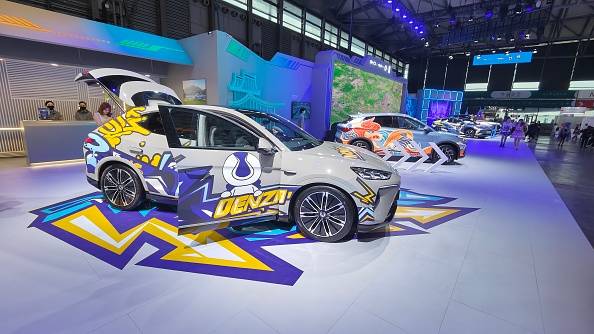
New energy electric vehicle company BYD's cartoon-style tattoo car is displayed at the 2024 ChinaJoy in Shanghai, China, July 29, 2024. (CFOTO/Future Publishing via Getty Images)
Africa is becoming a new market for Chinese electric car brands as imports of heavily subsidised Chinese electric vehicles are targeted by market regulators amid looming trade tensions between Beijing and Europe, the United States and Canada.
In mid-June, the European Commission announced that it would raise import tariffs on Chinese-made green cars to 38.1%, claiming that the products are subsidized by the Chinese government and thus violate fair competition in the European Common Market.
The United States and Canada have also raised concerns about Chinese government subsidies and proposed even higher 100% tariffs on Chinese-made EV imports.
Now, Chinese EV manufacturers are eyeing Africa as the best alternative market and are stepping up their penetration into the continent by expanding dedicated stores to more countries and partnering with local companies to enter the market.
BYD (Build Your Dreams), one of the best-selling Chinese electric vehicle brands in Europe, opened a showroom in Zambia in September this year, its fourth African market.
BYD will be showcasing its range of electric vehicles (EVs) and has signed a strategic partnership with Pilatus Electric Mobility Zambia Limited (PEM) to strengthen its efforts to expand its business in Africa.
BYD will enter the Rwandan market in January 2024, and after successful launches in South Africa in July 2023 and Kenya in 2022, it recently partnered with Ampersand in the country.
In Kenya, EV company BasiGo and local manufacturer Associated Vehicle Assemblers (AVA) have committed to integrating BYD's technology.
In June, another Chinese brand, NETA Auto, opened its first flagship store in Kenya and is looking to use the debut as a catalyst to expand into other African markets.
“Kenya is not only the gateway to Southern, Central and Eastern Africa but also a key hub of the Belt and Road Initiative. Leveraging Kenya's strategic location, NETA Auto aims to deepen economic and trade ties with African countries,” the company said in a statement.
Neta is a brand developed by Horizon New Energy Automobiles, an EV manufacturer founded in 2014 that plans to produce 127,500 units in 2023. The company plans to expand into 20 countries over the next two years, open 100 stores, and achieve annual sales of more than 20,000 units in Africa within three years.
XPENG, a smart electric vehicle maker also founded in China in 2014, has partnered with Egyptian automaker Raya Auto to introduce two of its brands to the North African market.
“We are confident about the promising opportunities in the Egyptian market and are eager to introduce cutting-edge, environmentally friendly electric vehicle technology to Egyptian consumers. We look forward to great success in the market,” Wang Ke, general manager of XPENG MEA region, said in a statement.
Research firm Statista predicts electric vehicle sales in Africa will reach just over 2,000 in 2024, rising to more than 3,600 by 2029, with government incentives and the need for sustainable transport solutions being the main drivers of adoption. The firm also asserts that Chinese car brands will be the main beneficiaries of this $204.8 million market in 2024.
According to Statista, “From an international perspective, it is clear that China will generate the largest revenues in the electric vehicle market.”
The expansion of China's EV brands' lineup is also expected to shake up Africa's larger mass-vehicle market, which is currently dominated by European and Japanese brands such as Volkswagen, Toyota and Suzuki.
The big advantage Chinese manufacturers have over more traditionally known brands is electric vehicles and potentially attractive price points, as European and Japanese brands in the market are primarily focused on gasoline vehicles and have only a few EV models available locally.
According to data from the International Organisation of Automobile Manufacturers (OICA), new car sales in Africa will reach 1,049,842 units by the end of 2023, with South Africa, the largest car market, recording the highest sales with 531,787 units, followed by Morocco (161,504 units) and Egypt (86,044 units).
But used cars dominate the African market, accounting for 85% of the continent's vehicle population, according to research firm Mordor Intelligence.
Mordor Intelligence points out that Egypt and Morocco are the African countries that are driving growth in the used car market in Africa, due to their wide consumer base and patronage of used cars. South Africa, Nigeria and Kenya are catching up after these two North African countries in terms of market growth.
“In recent years, rural consumers have been highly attracted to used cars due to their improved purchasing power and rising average disposable income,” the research firm said.
Bird Story Agency

